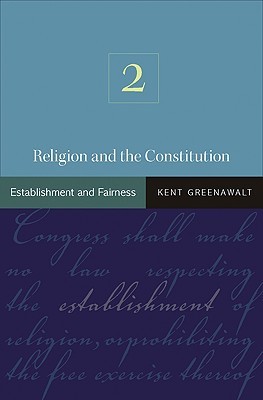
- We will send in 10–14 business days.
- Author: Kent Greenawalt
- Publisher: Princeton University Press
- ISBN-10: 0691141142
- ISBN-13: 9780691141145
- Format: 16 x 23.3 x 3.4 cm, softcover
- Language: English
- SAVE -10% with code: EXTRA
Reviews
Description
Balancing respect for religious conviction and the values of liberal democracy is a daunting challenge for judges and lawmakers, particularly when religious groups seek exemption from laws that govern others. Should students in public schools be allowed to organize devotional Bible readings and prayers on school property? Does reciting "under God" in the Pledge of Allegiance establish a preferred religion? What does the Constitution have to say about displays of religious symbols and messages on public property? Religion and the Constitution presents a new framework for addressing these and other controversial questions that involve competing demands of fairness, liberty, and constitutional validity.
In this second of two major volumes on the intersection of constitutional and religious issues in the United States, Kent Greenawalt focuses on the Constitution's Establishment Clause, which forbids government from favoring one religion over another, or religion over secularism. The author begins with a history of the clause, its underlying principles, and the Supreme Court's main decisions on establishment, and proceeds to consider specific controversies. Taking a contextual approach, Greenawalt argues that the state's treatment of religion cannot be reduced to a single formula. Calling throughout for acknowledgment of the way religion gives meaning to people's lives, Religion and the Constitution aims to accommodate the maximum expression of religious conviction that is consistent with a commitment to fairness and the public welfare.EXTRA 10 % discount with code: EXTRA
The promotion ends in 20d.09:00:05
The discount code is valid when purchasing from 10 €. Discounts do not stack.
- Author: Kent Greenawalt
- Publisher: Princeton University Press
- ISBN-10: 0691141142
- ISBN-13: 9780691141145
- Format: 16 x 23.3 x 3.4 cm, softcover
- Language: English English
Balancing respect for religious conviction and the values of liberal democracy is a daunting challenge for judges and lawmakers, particularly when religious groups seek exemption from laws that govern others. Should students in public schools be allowed to organize devotional Bible readings and prayers on school property? Does reciting "under God" in the Pledge of Allegiance establish a preferred religion? What does the Constitution have to say about displays of religious symbols and messages on public property? Religion and the Constitution presents a new framework for addressing these and other controversial questions that involve competing demands of fairness, liberty, and constitutional validity.
In this second of two major volumes on the intersection of constitutional and religious issues in the United States, Kent Greenawalt focuses on the Constitution's Establishment Clause, which forbids government from favoring one religion over another, or religion over secularism. The author begins with a history of the clause, its underlying principles, and the Supreme Court's main decisions on establishment, and proceeds to consider specific controversies. Taking a contextual approach, Greenawalt argues that the state's treatment of religion cannot be reduced to a single formula. Calling throughout for acknowledgment of the way religion gives meaning to people's lives, Religion and the Constitution aims to accommodate the maximum expression of religious conviction that is consistent with a commitment to fairness and the public welfare.

Reviews